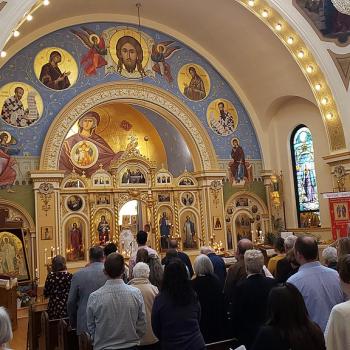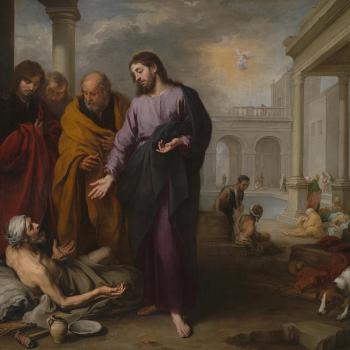
With decline church attendance becoming a serious problem that they have to deal with, many American Catholic bishops believe the solution lies in what they call a “Eucharistic Revival.” Strangely taking on the notion of revival from the American Protestant tradition, they hope they can create enthusiasm for the eucharist, and through that, bring people back to church. Sadly, what they are focusing upon will not bring people back. They have been led to believe that most Catholics no longer believe Catholic teaching on the eucharist, that is, in the real presence of Christ which is received in communion, based upon a rather faulty survey. This has led them to think that all that needs to be done is to have Catholics, including those who have fallen away from the faith, perceive the greatness of the eucharist and that will bring people back. It also makes things much easier for them if that is the real issue, for then they will not have to change the way they deal with the faithful. The problem behind that approach is that most Catholics, including those who, for whatever reason, do not frequently go to church, already understand what Catholic teaching is, and indeed, believe it. The reason why they are not going to church does not lie with their understanding of the eucharist, but something much more fundamental: they have lost their trust in the leaders of the church. They feel many, indeed, most of the church’s leaders, no longer look after or care for them. The leaders seem to care only about themselves; they seem interested in having a large number of people going to church so that they can be used as a tool for their own private interests. This is why so many people, especially those who have fallen away from church attendance, but also many who still go, see what is being done with the so-called “Eucharistic Revival” as reinforcing the problem. For example, they see a major problem with what is meant to be the highlight of the revival, the costly 2024 National Eucharistic Conference. The rich, the powerful are shown more preference than the poor and needy. They are the ones being welcomed at the conference. They are the ones who will be listened to and heard. This makes it clear that the direction of the revival is upside-down and inside-out. It is the opposite of what Pope Francis has encouraged with the Synod on Synodality. Similarly, many see the revival focused on two inter-related issues, both which also only make things worse. The first is lifting up the eucharist to be treated as some sort of magical talisman, while the second is to establish a campaign indicating who is and who is not worthy to touch or receive that talisman. In reality, no one is worthy: that the eucharist is meant to be a gift, not a reward.
The church is meant to be the continued presence of Christ in the world. And, in some respects, despite the wrongs done by the institutional church, it continues to be so, but that is thanks to the graces it has been given and not due to what its leaders do with those graces. Thankfully this is the case, that is, thankfully worthiness is not a requirement for leadership in the church, for if it were, many, if not most, of the clergy would no longer be able to dispense sacramental graces (as Donatists suggested). What it seems that the institutional church has failed to understand, and in doing so, find more and more people leaving it, is that the presence of Christ which is found in it is not meant to be selfishly hoarded up, but rather, it is meant to be used for the betterment of the world, to help heal it and the people within it, continuing the work of Jesus from his earthly ministry. What the crowds found attractive about Jesus is that he went beyond all legalistic expectations and false forms of piety to address them, to share with them his love and grace, to lift them up and make sure they were made better by their encounter with him. He went beyond all the ideological restrictions and impositions used to reinforce the structures and powers that be. He broke down the artificial divisions used to keep people always from each other. He served the outcasts, the disenfranchised, those whom the powers that be ignored or abused.
The institutional church, having lost sight of this, has lost the trust of the people. The people might still believe that grace can come in and through the institution, acknowledge the sacraments, but many of them, especially those who no longer frequent church services, will feel that the institutional church is working to keep the people away from the presence of Christ and the graces he is willing to share with them. They feel artificial barriers are being put up. They feel that if they want to experience the presence of Christ in their lives, they cannot trust they will do so through the institution and so they seek whatever grace they believe Jesus is willing to bring to them so long as they are faithful to him. Behind this is the recognition that God is not bound to the sacraments. They do not disbelieve in the eucharist, in the real presence, contrary to what bad surveys suggest, but they recognize that there are other ways Jesus is present in the world. They find themselves gravitating to those other forms of Jesus presence, such as the presence of Jesus in the poor and needy, finding themselves spiritually elevated by doing. And they believe Jesus promised that if they do so, they shall receive grace and with it, find their way to salvation, because they are truly engaging Jesus with all the graces he brings: “Truly, I say to you, as you did it to one of the least of these my brethren, you did it to me.”(Matt. 25:40b RSV). And, in doing so, they know they fulfill the true calling of the Christian in the world, something they feel the institutional church currently does not: “But the true sign of a Christian is the following: to feed the hungry and give drink to the thirsty, to endure hunger and thirst, to be poor in spirit, humble and contemptible in one’s own eyes, and for a man to beseech God both day and night that he might stand firmly in the truth.” [1]
Trying to restrict Jesus’s presence to that presence found in the eucharist is the last thing which is needed in order to have a “Eucharistic Revival.” Certainly, the eucharistic presence is different from other forms of his presence, but the more it is highlighted in such a way to separate Jesus from the people, to keep his presence aloft, with the notion that only specially chosen people who do what they are told are allowed to receive communion, the more the institutional church will discover that the people will not listen to it and look elsewhere for their spiritual nourishment. And to be sure, as even Augustine recognized, rightfully so. Many prelates are trying to find a way to cut out more and more people from receiving communion, justifying it with a legalism that is not traditional; they are trying to create the sense that only the worthy should receive communion, ignoring the fact that no one is truly worthy and so for anyone to set themselves up as worthy is to show how unworthy they really are. With more and more barriers put up, instead of attracting people to the eucharist, they make people look elsewhere, discovering that even if they do not have the eucharist itself, the graces found in the eucharist can still be had. The more worthiness of communion is perceived as being within the right political-ideological mindset, the more, likewise, people who have issues with that ideology will discern their presence is not wanted by the prelates and so they will look to where they believe Christ wants to meet them.
The eucharist is food, and its primary purpose is to bring us to communion; the more it is treated as a special dish which only a chosen few can be found worthy to receive, instead of the grace-filled gift which helps make people worthy by their reception, the more, once again, people will think it is not for them and look elsewhere. If the bishops want a true eucharistic revival, they would find ways to bring Jesus to the people, to break down the barriers, and not place more of them up. St. Alphonsus, understanding this, pointed out how many that others would try to keep from communion are those who should still be welcomed to it: “Similarly, a parish priest licitly may and must administer the Eucharist to a sinner, an excommunicate, and a secret heretic if he were to ask publicly; nay, more, a confessor ought to offer it to such a one seeking it, even privately, if he knows of his sin from confession alone.”[2]
If the bishops want a real revival on their hands, if they want to have people come back to church services, they must become more like Jesus, that is, become more like servants of the people caring for them and their needs instead of looking after themselves, their own personal interests, and whatever accolades they think they may receive. They should especially be interested in and concerned not with the rich and powerful, but with those who are oppressed by society; that is, they should live out the preferential option for the poor. The more they do that, the more they act like servants going out in the streets bringing whom they can find to the feast, the more they will bring back to the church thanks to the works of love they do. Of course, they should do so, not primarily to get people back into church, but because they love the people. They should love people, even if they do not come back, for that will prove it is love and not mere selfishness which has them out amongst the people. And the more people see this, the more they will become trusted. For without love, and without clear indication of such love, there will be no building up of the trust which has been destroyed thanks to years of sexual, physical, psychological, spiritual, and mental abuse coming from the institutional church. Thus, their focus should always be, not in ideology, not in sophistical theological discussions and explanations, not in acts of virtue-signaling piety, but in love. That will bring more people back to the church as well as help keep those who have not yet left. Their message than should be that of Jesus: “Come to me, all who labor and are heavy laden, and I will give you rest. Take my yoke upon you, and learn from me; for I am gentle and lowly in heart, and you will find rest for your souls. For my yoke is easy, and my burden is light” (Matt. 11:28-30 RSV).
The key to revival then is not catechesis, assuming the worst of what people know and understand of the faith and its teachings. The key is not some sort of moralism or legalism, reinforcing the notion that only a select few are truly worthy of receiving communion and the rest should stay away until they conform to those rigid expectations. Rather, the key is to truly go out to those in need, realizing everything else, from spiritual discipline to theological engagement, should serve the way the church should bring the presence of Christ into the world, especially to those most in need, that is, the poor and disenfranchised:
But, since our souls do not attain to salvation by fasting alone, let us supplement our fasting with acts of mercy toward the poor. Let us spend on virtue what we withhold from pleasure. Let abstinence on the part of someone fasting become nourishment for the poor. Let us put our efforts to the defense of widows, the advantage of orphans, the consolation or mourners, the reconciliation of rivals. Take in the stranger, relieve the oppressed, clothe the naked, care for the sick – in such a way that whoever of us will offer from honest labor a “sacrifice” of compassion to God the Maker of all good things, they might deserve to receive from him as a reward the kingdom of heaven. [3]
This is what any “Eucharistic Revival” should emphasize to those who are already regular church goers. They must be encouraged to join the journey of Christ to the poor, making sure their own religious adherence is done with the right spirit, not one of selfishness, but of self-giving love. Their role in the revival should be the same role of the clergy, the same role of the whole church. They should find themselves becoming the hands and feet of God working in the world, to let Jesus work in and through them to meet those who are need. The more they do this, the more they will help bring people to the presence of Christ. Then, the presence of Christ will be felt in the world. It should never be locked away and hidden from the world. “A great motive, then, for us is the dignity of this work. To make God known to the poor, to announce Jesus Christ to them, to tell them that the kingdom of heaven is at hand and that it is for the poor. Oh, how great that is!”[4] This, not eucharistic processions, not eucharistic adoration, not discussions on the real presence and what it means, though they can have a role, should be the central focus of the institutional church.
[1] Saint Isaac the Syrian, The Ascetical Homilies of Saint Isaac the Syrian. Trans. Monks of the Holy Transfiguration Monastery. Rev. 2nd ed (Boston, MA: Holy Transfiguration Monastery, 2011), 565 [First Epistle of Saint Macarius of Alexandria On the Christian Discipline, not St Isaac].
[2] St. Alphonsus Liguori, Moral Theology. Volume I: Books I – III On Conscience, Law, Sin and Virtue. Trans. Ryan Grant (Post Falls, ID: Mediatrix Press, 2017), 594 [Quoting from Busembaum’s Moral Theology, which is the source and foundation for Alphonsus’ work, as Alphonsus’ work often acts as a commentary to it].
[3] St Leo the Great, Sermons. Trans. Jane Patricia Freeland CSJB and Agnes Josephine Conway SSJ (Washington, DC: CUA Press, 1996), 54 [Sermon 13].
[4] St. Vincent de Paul, “Conference 6 December 1658” in Vincent de Paul and Louise de Marillac: Rules, Conferences, and Writings. trans. Hugh F. O’Donnell, Frances Ryan, Louise Sullivan, Vie Thorgren and Edward R Udovic (New York: Paulist Press, 1995), 140-1.
Stay in touch! Like A Little Bit of Nothing on Facebook.
If you liked what you read, please consider sharing it with your friends and family!
N.B.: While I read comments to moderate them, I rarely respond to them. If I don’t respond to your comment directly, don’t assume I am unthankful for it. I appreciate it. But I want readers to feel free to ask questions, and hopefully, dialogue with each other. I have shared what I wanted to say, though some responses will get a brief reply by me, or, if I find it interesting and something I can engage fully, as the foundation for another post. I have had many posts inspired or improved upon thanks to my readers.













